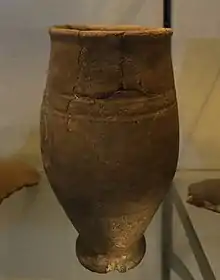Romano-British Pottery was produced from the 1st through the 5th centuries AD in Britain, during the period of occupation by the Roman Empire.[1] Before the invasion of the Romans, pottery in Britain was handmade and fired in a bonfire. The Romans introduced the new technology of fast potters wheels and kilns for firing. The newer manufacturing methods resulted in a pottery that was different from the previous period's pottery. Romano-British pottery has a thinner, harder and smoother fabric than both Iron Age (800 BC–100 AD) and Anglo-Saxon pottery (500–1066 AD).[2]
List of Romano-British pottery
This is a partial list of Romano-British pottery.
| Pottery Name | Time period | Characteristics | Origin | Image |
|---|---|---|---|---|
| Black-burnished ware | 2nd to 4th centuries CE | Two classes of wares: I and II | Dorset area and Thames Estuary[3] | .jpg.webp) |
| Crambeck Ware | 4th century AD | One of two main Romano-British pottery industries in Yorkshire | Crambeck, Yorkshire[4] |  |
| Dales ware | 3rd to 4th centuries AD | Used often as burial urns | South Yorkshire and Lincolnshire[5] |  |
| Hadham Red ware | 2nd to 4th centuries AD | Used often as burial urns | Cambridgeshire[2][6] | .jpg.webp) |
| Huntcliff ware | 4th to early 5th centuries AD | Used often as burial urns | East Yorkshire[7] | |
| Nene Valley Colour Coated Ware | 2nd to 4th centuries AD | Barbotine-type decoration | Lower Nene Valley[8] |  |
| Oxfordshire colour coated ware | 3rd to 4th centuries AD | Produced in Oxfordshire, distributed across Britain | East Anglia[9] | .jpg.webp) |
| Vectis ware | 2nd to 5th centuries AD | Production began prior to Roman occupation | Isle of Wight[10] |  |
See also
References
- ↑ Simon Hornblower; Antony Spawforth, eds. (1998). The Oxford Companion to Classical Civilization. Oxford University Press. ISBN 978-0-19-860165-4.
- 1 2 "Roman Pottery Identification" (PDF). Jigsaw Cambridgeshire Best Practice User's Guide. Retrieved 20 October 2021.
- ↑ Timby, Jane (2013). "Material Culture: pottery and fired clay". In Cunliffe, Barry (ed.). The Roman Villa at Brading, Isle of Wight: The Excavations of 2008-10. Oxford School or Archaeology. p. 192. ISBN 9781905905263.
- ↑ Monaghan, G. 1997.Roman Pottery from York (Archaeology of York Series 16/8). York: York Archaeological Trust. pp903-906
- ↑ Margaret Darling; Barbara Precious (31 January 2014). A Corpus of Roman Pottery from Lincoln. Oxbow Books. pp. 83–. ISBN 978-1-78297-054-5.
- ↑ "Hadham Red Ware". Fen Edge Archaeology Group. Retrieved 20 October 2021.
- ↑ "Huntcliff ware on the National Roman Fabric Reference Collection". Museum of London. Archived from the original on 22 December 2013. Retrieved 18 October 2021.
- ↑ "Nene valley Colour Coated Ware". PotSherd. 1996. Retrieved 22 April 2014.
- ↑ "Oxfordshire Red-Brown Slipped wares". Potsherd: Atlas of Roman Pottery. Retrieved 20 October 2021.
- ↑ Tomalin, David J (1987). Roman Wight A Guide Catalogue to "The Island of Vectis, very near to Britannia". Isle of Wight County Council. pp. 30–31. ISBN 0906328373.
This article is issued from Wikipedia. The text is licensed under Creative Commons - Attribution - Sharealike. Additional terms may apply for the media files.